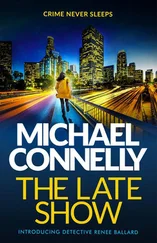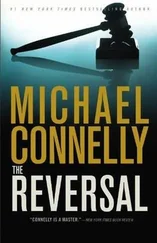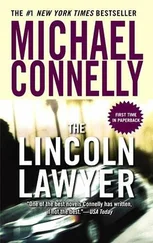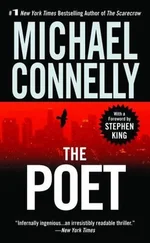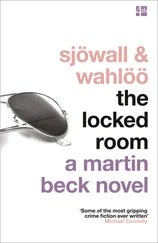He waited. Hardy said nothing. Bosch put the muzzle down against his chest and angled the gun again.
“All right, all right,” Hardy said desperately. “Next door. Everything’s next door. My father owned both places. I have it set up with a phony name on the deed. You go look. You’ll find everything you need.”
Bosch stared down at him for a long moment.
“If you’re lying, you’re dying.”
He withdrew the gun and holstered it. He started to get up.
“How do I get in?”
“The keys are on the counter in the kitchen.”
The odd smile returned to Hardy’s face. A moment ago he was desperate to save his own life, now he was smiling. Bosch realized it was a look of pride.
“Go check it out,” Hardy urged. “You’re going to be famous, Bosch. You caught the goddamn record holder.”
“Yeah? How many?”
“Thirty-seven. I planted thirty-seven crosses.”
Bosch had guessed that there were going to be numbers, but not that high. He wondered if Hardy was inflating his kills as part of one last manipulation. Say anything, give anything, just to get out the door alive. All he had to do was survive this moment and he could slip into the next transformation, from unknown and uncharted killer to figure of public fascination and fear. A name that would inspire dread. Bosch knew it was part of the fulfillment process with their kind. Hardy had probably lived in anticipation of the time he would become known. Men like him fantasized about it.
In one smooth and swift move, Bosch pulled the Glock from his holster again and brought its aim down on Hardy.
“ No! ” Hardy yelled. “We have a deal!”
“We don’t have shit.”
Bosch pulled the trigger. The metal snap of the firing mechanism sounded and Hardy’s body jerked as if shot, but there was no bullet in the chamber. The gun was empty. Bosch had unloaded it up in the bedroom.
Bosch nodded. Hardy had missed the tell. No cop would’ve had to chamber a round, because no cop would’ve left the chamber empty. Not in L.A., where the two seconds it takes to chamber a round could cost you your life. That had been just part of the play. In case Bosch had had to string it out.
He reached down and rolled Hardy over. He put the gun down on his back and from his suit pocket took out two snap ties. He cinched one around Hardy’s ankles, binding them tightly together, and then used the other on his wrists so he could remove his handcuffs. Bosch had a feeling he would not be the one escorting Hardy to jail and he didn’t want to lose his cuffs.
Bosch stood up and hooked his cuffs back on his belt. He then reached back into his coat pocket and took out a handful of bullets. He ejected the empty magazine from his gun and started reloading it. When he was finished, he slid the magazine back into place and racked one bullet into the chamber before returning the weapon to its holster.
“Always keep one in the chamber,” he said to Hardy.
The door opened and Chu stepped back in, carrying his laptop. He looked at Hardy lying prone on the floor. He had no idea what Bosch’s play had been.
“Is he alive?”
“Yes. Watch him. Make sure he doesn’t do the kangaroo.”
Bosch walked down the hallway to the kitchen and found a set of keys on the counter where Hardy had said they would be. When he came back to the living room, he looked around, trying to figure out a way of securing Hardy while he and Chu conferred privately outside about how to proceed. An embarrassing story had gone around the PAB a few months earlier about a robbery suspect dubbed the Kangaroo. He had been bound at the ankles and wrists and left on the floor of a bank while the arresting officers looked for another suspect they believed was hiding in the building. Fifteen minutes later officers in another responding car saw a man hopping down the street, three blocks from the bank.
Finally, Bosch got an idea.
“Get the end of the couch,” he said.
“What are we doing?” Chu asked.
Bosch pointed him to the end.
“Tip it.”
They tipped the couch forward on its front legs and then down over Hardy. It tented him and made it almost impossible for him to try to stand up with his arms and legs bound.
“What is this?” Hardy protested. “What are you doing?”
“Just sit tight, Hardy,” Bosch replied. “We won’t leave you too long.”
Bosch signaled Chu toward the front door. As they were going out, Hardy called out.
“Be careful, Bosch!”
Bosch looked back at him.
“Of what?”
“Of what you’ll see. You won’t be the same after today.”
Bosch stood with his hand on the knob for a long moment. Only Hardy’s feet were visible, extending from under the overturned couch.
“We’ll see,” he said
He stepped out and closed the door.
It was like being at the end of a maze and having to work their way back to the starting point. They had the location they wanted to search — the town house next door, where Hardy claimed he kept his stash of keepsakes from his kills. They just had to figure out the chain of events and legal steps taking them to it that could be put in a search warrant and that would be accepted and approved by a superior court judge.
Bosch did not reveal to Chu what had occurred in Hardy’s living room while Chu was back at the car. Not only was there the trust issue that had exploded on the Irving case, but Bosch had no doubt coerced a confession from Hardy, and he would not share that transgression with anyone. If and, more likely, when Hardy claimed coercion as part of his defense, Bosch would simply deny it and dismiss it as an outrageous defense tactic. There would be no possibility of anyone other than Hardy — the accused — being able to attack Bosch’s story.
So Bosch told Chu what they needed to do and they worked out how to get there.
“Chilton Hardy Senior, who is most likely dead, is supposed to be the owner of these two town houses. We need to search them both and we need to do it now. How do we get there?”
They were standing on the grass in front of the town house complex. Chu looked at the facades of units 6A and 6B as if the answer to the question might be painted on them like graffiti.
“Well, probable cause on six B is not going to be a problem,” he said. “We found him there living as his father. We’re entitled to search for any indication of what happened to the old man. Exigent circumstances, Harry. We’re in.”
“And what about six A? That’s the place we really want.”
“So we. . we just. . Okay, I think I got it. We came down to interview Chilton Hardy Senior but halfway through we realize that the guy in front of us is actually Chilton Hardy Junior. There is no sign of Hardy Senior and we’re thinking he might be tied up somewhere, being held captive, who knows what. Maybe he’s alive and maybe he’s dead. So we run a history search on the property appraiser’s database, and lo and behold, he used to own the place right next door and the transfer of title looks phony. We have an obligation to go in there to see if he is alive or in some kind of peril. Exigent circumstances again.”
Bosch nodded but frowned at the same time. He didn’t like it. It sounded to him like exactly what it was. A story made up to get them in the door. A judge might sign the search warrant but they’d have to find a friendly one. He wanted something bulletproof. Something that any judge would approve and that would hold up upon subsequent legal challenges.
Suddenly he realized he had their access right in his hand. In more ways than one. He held up the key ring. There were six keys on it. One carried the Dodge logo and was obviously to a vehicle. There were two full-size Schlage keys that he assumed were the keys to the front doors of the two apartments, and then three smaller keys. Two of these were the small keys used to open private mailboxes like the kind they had seen out at the curb.
Читать дальше


